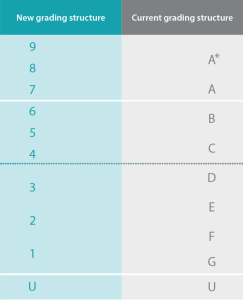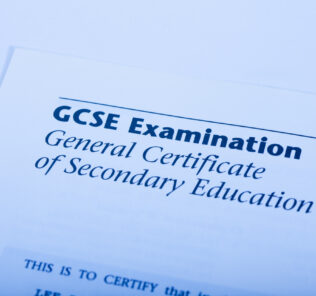GCSE results 2023: The new 9 – 1 GCSE Grade boundaries explained
As students receive their GCSE results 2023 tomorrow, parents and families might be wondering about the significance of the new 9 – 1 GCSE grade boundaries – especially as they are not directly comparable with the A – E GCSE grade boundaries that were previously awarded.
The new GCSE grade boundaries
The new GCSE grade boundaries were brought in gradually following a 2014 curriculum overhaul.
The marking boundaries were changed in phases over a period of years, with the aim that all GCSE subjects would be graded using the new numerical system by 2020.
Due to the exam-disruption of COVID, 2022 was the first year that the new grade boundaries applid to every subject in exams that were sat in person and marked externally, so they are still new to many people who are used to the old alphabtical system.
The new GCSE grade boundaries are now marked from 9 – 1 (9 being the highest, and 1 the lowest), while U retains the meaning of ‘ungraded’.
How do the new 9 – 1 grades relate to the old A – E ones?
The new numerical grading system does not directly correlate to the old alphabetic grading system for GCSEs. There are, however, comparable points at key grades:
- The bottom of a grade 7 is comparable to the bottom of the old grade A
- The bottom of a new grade 4 is comparable to the bottom of the old grade C
- The bottom of the new grade 1 is comparable to the bottom of the old grade G
Ofqual says it has been clear to employers, universities and others that if they previously set entry requirements of at least a grade C, then the equivalent now would be to require at least grade 4.
Ofqual has also said that fewer grade 9s will be awarded than A*s, to signify truly exceptional performance.
What is a ‘Pass’ GCSE grade?
Students need to get a 4 for a “standard pass” and 5 for a “strong pass”, which is equivalent to a high C and low B on the old grading scale.
A pupil who gets all grade-4s has, technically, passed all their exams – however, sixth forms may require a minimum number of 5 or 6 grades as a condition for further study.
Why was a new GCSE grade scale introduced?
According to the exam-board regulator Ofqual, it was decided that GCSEs in England needed to be reformed to keep pace with universities’ and employers’ demands:
“The reformed GCSE exams are based on new and more demanding subject content, but are still suitable for the same wide range of abilities. The new grade scale is intended to make it clear to everyone that students have studied the new GCSEs.”
“It also has more higher grades compared to the old A* to G grades, to give sixth forms, colleges, universities and employers the opportunity to better distinguish between students of different abilities.”
Will my child be disadvantaged by the 2023 GCSE grade boundaries?
Aside from the new grading scale, the way exams are marked has been changed to be tougher in 2023, to try and counter the grade inflation that we saw in 2020 and 2021 when all exams were marked internally by teachers, as well as in 2022, when exams were marked more generously as an allowance for pandemic disruption.
To find out more about how the GCSEs are being marked this year read our story on When GCSE grade boundaries are released? And how to appeal your GCSE grade 2023?
© SchoolsCompared.com. A WhichMedia Group publication. 2023. All rights reserved.











































































Leave a Response